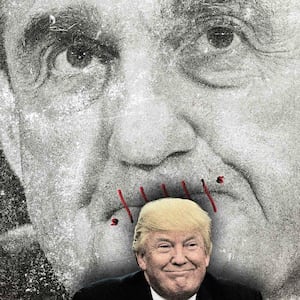“No collusion” has by now become a familiar refrain from President Donald Trump and his supporters to deny allegations of involvement with Russian efforts to influence the 2016 presidential election.
Senator Richard Burr, the Republican chairman of the Senate Intelligence Committee, said last week that his committee’s investigation has found “no collusion” between Trump and Russia, a statement that Trump promptly trumpeted on Twitter.
But is asking whether “collusion” occurred the right question? When I was in law school, a professor taught us that arguments are often won or lost by the framing of the issue. While it may be true that no collusion can be found, is that the same as saying that no crimes were committed?
“Collusion” is a word not generally found in the U.S. criminal code, with limited exceptions. Collusion is defined as a secret agreement for a deceitful purpose. In the law, it applies most often in the antitrust context, where two or more companies agree to fix prices at a higher level than would result from competition in the marketplace. That is not what is at issue in the Russia investigation.
Instead, Special Counsel Robert Mueller is likely looking at conspiracy, not collusion, based on some of the indictments he has already filed. His theories of election interference appear in two of his indictments, the case filed against the Internet Research Agency and others relating to the use of social media to influence the election (Russia’s “troll farm”), and the case filed against 12 Russian intelligence officers for hacking into computers and stealing email messages. In both cases, Mueller charged conspiracy.
In defense of Trump and his associates, collusion is a word used by Deputy Attorney General Rod Rosenstein in his memo laying out Mueller’s mission. The heavily redacted memo directed Mueller to investigate, among other things, whether former Trump campaign chair Paul Manafort “committed a crime or crimes by colluding with Russian government officials with respect to the Russian government’s efforts to interfere with the 2016 election for President of the United States, in violation of United States law.” As used in the memo, collusion was one among other possible manners in which Manafort may have committed a crime.
Conspiracy, on the other hand, is a criminal agreement. Conspiracy is a crime even if the parties to the agreement never achieve their goal. The elements of conspiracy are (1) an agreement by two or more people to commit a crime or to defraud the United States by interfering with the proper functioning of a government agency; (2) that the defendant knowingly and voluntarily joined the conspiracy; and (3) that at least one member of the conspiracy committed at least one overt act in furtherance of the conspiracy. An overt act need not be an illegal act, just some step to advance the scheme. For instance, an overt act could be a phone call or a payment.
To amount to a conspiracy, the criminal agreement may be explicit or implicit. That means that a conspiracy need not be a formal agreement, and it need not be in writing or even spoken. Conspiracy does not require proof that everyone agreed to all of the details, just a mutual understanding of an agreement to complete the object of the conspiracy.
An important aspect of conspiracy law is that it is not necessary to prove that a defendant knew everything about the conspiracy, or that he knew everyone else involved in the conspiracy. In addition, a defendant may be convicted of conspiracy even if he was not a member of it from the very beginning. Conspiracy also does not require proof that a defendant played a major role in the conspiracy. A slight role or connection is enough.
These principles are important in considering whether members of the Trump campaign may be charged with conspiracy in the Russia investigation. In the indictment against the Internet Research Agency, Mueller charged three entities and 13 individuals with conspiracy to defraud the United States by impairing the lawful functions of the Federal Election Commission, among other things. The indictment alleged that the defendants used social media accounts to engage in “information warfare” to interfere with the election by spreading “distrust towards the candidates and the political system in general.”
In indictment against the Russian intelligence officers, Mueller alleged that the object of the conspiracy was to “hack into the computers of U.S. persons and entities involved in the 2016 U.S. presidential election, steal documents from those computers, and stage releases of the stolen documents to interfere with the 2016 U.S. presidential election.” This indictment alleges that the defendants transferred the stolen emails to “Organization 1,” believed to be Wikileaks, for public release to “heighten their impact” on the election.
It is not difficult to imagine that Mueller and his team are investigating whether any Americans joined either of these conspiracies, even if they joined after they began, and even if their role was slight. For example, if someone were to suggest which emails to release or the timing of their release to maximize their impact, then that person could be charged as a co-conspirator. As discussed above, the co-conspirator need not have been a member of the conspiracy from the very beginning. If the Russian members of the conspiracy hacked computers and stole emails on their own, but a Trump associate participated in “staging the release” of the emails, that person could be charged as a co-conspirator. In fact, emails were released on the same day as the disclosure of the Access Hollywood tape, in which Trump could be heard disparaging women, an event that was devastating to his campaign. If a Trump associate suggested to Wikileaks that emails stolen from Hillary Clinton’s campaign chairman be released that same day to obscure the Access Hollywood story, then he could be charged as a co-conspirator. Is that conduct collusion? Maybe not. Is it conspiracy? Yes.
Yesterday, a federal judge found that Manafort breached his plea agreement by lying to prosecutors about matters under investigation. As a result, he faces substantially more prison time. What was Manafort so determined to conceal to risk such severe consequences? Perhaps more evidence of an agreement to violate the law, that is, conspiracy?
Even if Mueller is not able to prove a criminal conspiracy, he might also find conduct that amounts to “high crimes” or “misdemeanors,” the standard for impeachment. Cass Sunstein has written in his book, Impeachment, a Citizen’s Guide, that procuring the presidency by fraud would be a basis for impeachment. For example, it may be that Mueller does not conclude that all of the elements of a conspiracy occurred, but that members of the Trump campaign became aware of the Russian attack and allowed it to continue without reporting it to the FBI. Would that sort of betrayal constitute collusion? Maybe not. Might it constitute a basis for impeachment? Yes.







